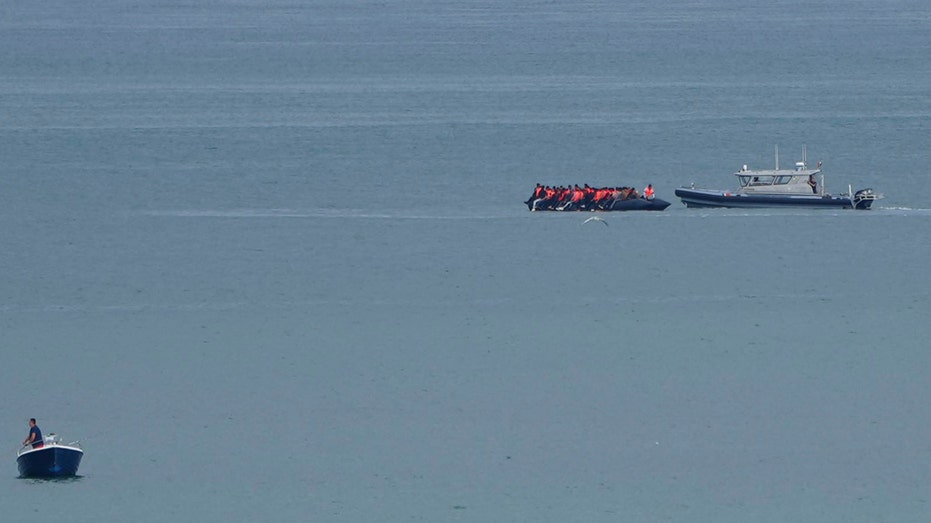Another migrant boat spotted on English Channel day after mass-casualty wreck
Another boat carrying suspected migrants has been spotted in the English Channel, just a day after a dozen others died trying to cross the same body of water.

A day after 12 migrants died when their small inflatable ripped apart on a failed effort to cross the English Channel, several dozen others made another crossing attempt on a crowded vessel from northern France on Wednesday, as French patrol boats watched it labor through the seas.
That migrants were prepared to risk their lives so soon after a dozen others lost theirs trying to cross the busy waterway from France to Britain underscored the magnitude of the problem for the French and U.K. governments. It was the deadliest accident involving a migrant boat in the English Channel this year.
The mayor of Wimereux, a French coastal town where Associated Press journalists filmed the crowded inflatable boat on Wednesday, pleaded for French and British officials to do more to limit the number of migrants attempting the often perilous journey.
"Unfortunately, every day is like this for us. The smugglers — a criminal network — continue with insistence to send people to their deaths in the channel. It really is unacceptable, scandalous. And it is high time that a lasting solution is found with Britain," Mayor Jean-Luc Dubaële said by phone.
10 DEAD, OTHERS IN CRITICAL CONDITION AFTER MIGRANT VESSEL REPORTEDLY CAPSIZES IN ENGLISH CHANNEL
"Let's ask ourselves the question: Why do they want to go to Britain? Because something is drawing them there," he said. "They can ask for asylum in France. (But) none ask for the right to asylum in France. They all want to go to Britain. So it is high time that we sit around a table with the new British government."
Cross-Channel migration was a key focus in the U.K. general election in July, which the Labour Party won resoundingly to make its leader, Keir Starmer, the new prime minister.
A French prosecutor investigating Tuesday's sinking, Guirec Le Bras, said 10 of the 12 dead were women and six of the victims were minors. Many appeared to be Eritrean, he said. The inflatable boat sank about 3 miles off the French coast, he said. Maritime authorities said many aboard didn't have life vests.
Fishermen who recovered some of the dead said they were moved to tears.
"The bodies of two women were very young. That hurt me. I cried all day. I couldn’t stop," said 53-year-old Samba Sy Ndiaye, who works aboard the Murex, one of two fishing boats that assisted the French rescue effort.
Another crew member, Axel Baheu, said the body of one young woman – he guessed she was between 15 and 20 – had a telephone in a waterproof pouch around her neck. It started to ring as he was pulling her out of the water and checking for a pulse, he said.
"That was hard because you know full well that no one will ever answer," Baheu said.
His father, Jean Marie Baheu, said he saw another heavily laden migrant boat set off Wednesday in front of his house.
"When the weather is good and there’s no wind, there are departures every day," he said. "At the beginning, you’d see 20, 30 people. Now, it’s minimum 70, 80."
The inflatable boat the AP saw and filmed on Wednesday was carrying migrants, French maritime authorities confirmed. AP journalists estimated that 40 to 50 people were aboard.
Many wore life preservers. A patrol boat flying a French flag approached the inflatable at one point and the crew tossed more life vests — about half a dozen — to the migrants.
The English Channel's gray seas were comparatively calm, with small waves lapping the beach as people walked dogs on the sand.
Still, the inflatable appeared to make slow headway. Even though journalists filmed it for more than two hours, it remained clearly visible from shore, with the patrol vessel buzzing around it and a larger one shadowing it from farther away.
The French maritime agency that oversees that stretch of sea said the boats were monitoring the inflatable in case it ran into difficulty or people aboard requested assistance.
In a statement to the AP, the agency said that although maritime law forbids the use at sea of makeshift inflatables, it's too dangerous to force them back to shore when the boats are heavily laden.
"It's difficult to achieve with more than 50 people on board who are vehemently refusing to be rescued. The main risk is a stampede on board and then a capsizing, these boats being neither stable nor reliable. The risk of loss of human life being too high for an intervention under duress, the choice is made to prioritize the protection of the people on board and by simply monitoring from a distance the navigation capabilities of these boats," the statement said.
"It is therefore more a question of ethics than of blind application of the law," it added.
By the U.K. government's count, at least 21,720 migrants have managed to cross the English Channel so far this year. That's 3% more than at the same stage last year, but 19% lower than during the same period in 2022.
The boat that ripped apart on Tuesday, plunging 65 people into the sea, was one of several crossing attempts that day. British authorities said at least 317 migrants succeeded, arriving aboard five boats.
One of the first measures the new U.K. government immediately enacted was to scrap the previous Conservative government’s plan to send some migrants arriving in small boats to Rwanda rather than being allowed to seek asylum in Britain. Human rights groups criticized the plan.
Starmer called the plan a "gimmick" and wouldn't act as a deterrent. Instead, his government has opted to divert some of the money saved from ditching the program into setting up a strengthened border force to "smash" the criminal gangs behind the small-boat arrivals.















